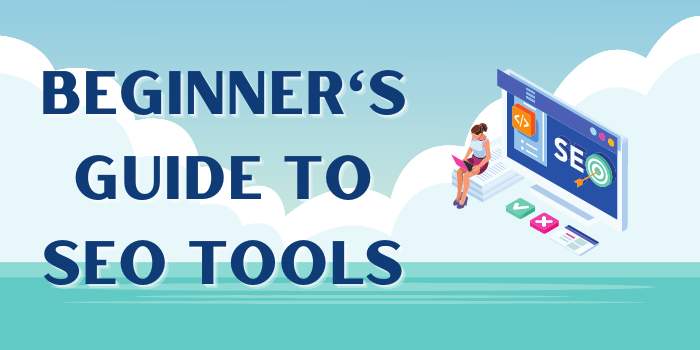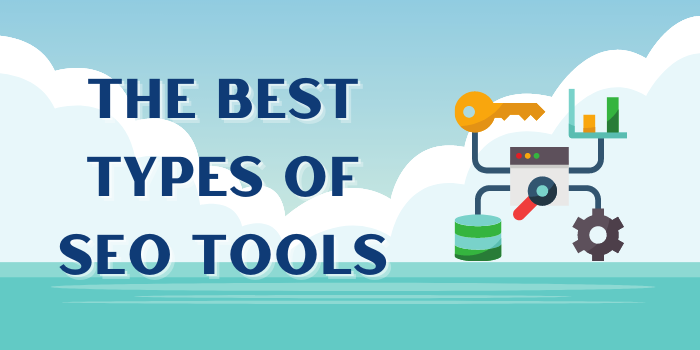- Blog Home
- Seo
- Jubilee Heutmaker
- Beginner's Guide To Seo Tools
Beginner's Guide to SEO Tools

Search engine optimization, often referred to as SEO, is a complex field that can be likened to a vast, intricate puzzle. To navigate this digital landscape, companies have developed a myriad of tools aimed at simplifying the process of ranking websites. However, for beginners venturing into the world of SEO, a common question often lingers: Are SEO tools necessary?
From the high cost to the sheer number of options on the market, it's easy to feel overwhelmed. What are the exact tools that will help simplify your SEO journey? It doesn't help that every SEO expert seems to have a different opinion on which tools are essential and which ones aren't.
In this comprehensive beginner's guide, we will thoroughly explore the world of SEO tools. You'll discover whether you genuinely need them and, if so, learn how to identify which ones are best for your unique needs.
What Are SEO Tools?
An abundance of SEO tools are available, each claiming to offer a unique advantage. However, the truth is that SEO tools cannot perform tasks beyond your capabilities. They simply provide the ability to execute them at a larger scale and faster pace. They also grant access to valuable data that may otherwise be fragmented, incomplete, or inaccessible without their comprehensive databases.
With that said, there's no doubt that SEO tools can offer real value to your company. The trouble you'll encounter is comparing your many options and determining which ones are actually useful to your business.
SEO tools can be broadly classified into a few categories based on their primary functionalities. These include:
- All-in-One Tools: Comprehensive platforms offering a range of functionalities, from keyword research to backlink analysis, often serving as a one-stop shop for SEO needs.
- Keyword Research Tools: Dedicated to helping users identify the right keywords to target based on search volume, competition, and other relevant metrics.
- Social Media Marketing Tools: Focus on monitoring, analyzing, and enhancing your presence on social media platforms, helping in audience engagement and brand visibility.
- Content Marketing Tools: Assist in the creation, optimization, and distribution of content, ensuring it is both relevant and engaging to your target audience.
- Backlink Analysis Tools: Provide insights into your website's backlink profile, revealing both the quality and quantity of links and often comparing them to competitors.
- Technical SEO Tools: Designed to identify and rectify issues related to site architecture, loading speed, mobile compatibility, and other technical aspects.
- On-Page SEO Tools: Aim to optimize individual web pages for search engines, focusing on elements like meta tags, content quality, and keyword density.
Each category addresses specific aspects of digital marketing and SEO, ensuring businesses can tackle challenges in a targeted manner. Recognizing which category or combination of tools your business needs will streamline your decision-making process.
Another vital factor of each SEO tool is its user interface and learning curve. While some tools are packed with features, they can also have a steep learning curve. This might not be suitable for beginners or small teams without a dedicated SEO specialist. Conversely, simpler tools might lack advanced features but are more user-friendly.
As with any tool, an SEO tool's effectiveness is only as good as the strategy behind its use. Merely having access to a tool does not guarantee improved rankings. It requires understanding the insights provided, the ability to interpret data correctly, and the execution of a well-planned strategy based on the information gathered. The real magic happens when the power of the tool is combined with the expertise of the user.
Benefits of SEO Tools
The benefits of an SEO tool vary depending on the job the tool promises to perform. In general, such tools make it easier for a website owner to optimize their site for search engines, increasing visibility and driving traffic. Within that scope, a wide variety of tools are available, each with its own specific benefits.
Audit to Discover Issues
Running manual audits is necessary if you don't have the means to have your site audited automatically. However, most SEO tools have some sort of audit feature that will crawl your website and discover potential issues. The tool should alert you quickly to these problems, giving you the chance to address them before they negatively affect your visitors or rankings.
An example of a problem a site audit might reveal is broken links you need to replace or redirect. A site audit can also reveal images missing alt text or posts that don't have a meta description. While some of these issues are more important than others, having an audit performed on a fixed schedule will ensure no problem goes unnoticed.
Consistent, proactive audits can also prevent potential security threats. For example, a site audit may reveal outdated or vulnerable plugins that need to be updated ASAP. This can help protect your site from cyber attacks and maintain the trust of your visitors.
Take Advantage of Automation
Most SEO tools offer some form of time-saving automation that can help you perform tasks at a speed or volume you otherwise wouldn't have time for. For instance, many tools compile data about how your competitors' rankings change daily. While this is something you could manually check, it would be extremely time-consuming.
Another example that better fits the technical definition of automation is a backlink outreach tool. This kind of tool helps marketers automate the process of reaching out to other websites to solicit backlinks, which is an important part of SEO. Typically, they discover prospects for you and even help you craft personalized messages (often using AI) that are more likely to get responses from website owners. These tools promise to help you earn more backlinks with just a few clicks a day.
Other examples of automation in SEO tools include automated content scheduling, optimizing post timing for peak engagement, and even monitoring brand mentions or specific keywords in real time. Scripted offers platform users a variety of AI-assisted features that can help streamline and automate content creation tasks. This includes our Blog Post Generator and Keyword Research Tool. Try out our platform for free!
Reveal Competitor Strategies
Most SEO tools offer at least one feature that helps you dig into your competitor's SEO strategy, allowing you to ethically "spy" on what they're doing through compiled data of new content, new backlinks, and ranking changes.
By consolidating public information in one place and utilizing analysis tools, you can link outcomes and performance to repetitive approaches and actions. This will enable you to enhance your SEO strategy and gain a competitive edge in any niche.
Understanding competitors' strategies can help not just in imitation but also in differentiation. By knowing what everyone else is doing, you can find unique approaches and niches they might be overlooking.
Enhance Data Interpretation
SEO tools don't just provide data; they often come equipped with features that help interpret that data. Visualization aids, like charts and graphs, make it easier for users to understand trends, peaks, and drops in their website's performance.
Rather than sifting through raw numbers, these tools provide insights that are immediately actionable, streamlining the optimization process. This capability ensures that even those without deep technical expertise can derive valuable insights and make informed decisions.
Improve Content Optimization
SEO tools frequently offer suggestions on how to enhance the quality of your content. Through keyword density analysis, readability scores, and sentiment analysis, these tools guide you in refining your content to make it more user-friendly and search engine optimized. By leveraging such insights, you can produce content that appeals to your audience and also ranks higher in search results.
Stay Updated with Algorithm Changes
Search engine algorithms are constantly evolving, and keeping up with these changes manually can be daunting. Many SEO tools are updated in real-time to reflect these shifts, ensuring you're always optimizing your website based on the latest best practices. This ensures your strategies are always up-to-date, and you aren't caught off guard by sudden changes in your website's performance.
Track ROI and Performance Metrics
Understanding the return on investment (ROI) is crucial for any business decision, and SEO tools can help quantify the benefits of your SEO efforts. By tracking metrics like organic traffic, conversion rates, and click-through rates, these tools provide a clear picture of how your SEO initiatives directly contribute to your business's bottom line.
The Best Types of SEO Tools
To determine which SEO tools you should invest in, you first need to know what your options are. Here's a review of the best types of SEO tools on the market.
All-in-One Tools
- For brands with a big budget and not a lot of time.
- For those who want lots of features in one dashboard.
Many SEO tools promise to be an "all-in-one" solution with a host of features bundled into one platform. However, these all-in-one tools come with a hefty price tag, and they may or may not suit your needs even if they fit your budget. For a smaller company with a more limited SEO budget, it's worthwhile to define the exact features you're looking for in a tool and then compare your options.
Instead of opting for an all-in-one tool, get specific about the features you'll actually use and need. If you can find those features in other tools that you can use side-by-side for significantly less money, it's worthwhile to do so. With that said, there are certainly benefits to having all your tools and data in one platform. They're essentially the Swiss Army knives of the SEO world, combining various features and functionalities to offer a comprehensive solution in one convenient package.
The following are some of the most well-known and popular all-in-one SEO tools.
Ahrefs
Ahrefs has positioned itself as one of the premier all-in-one SEO tools, celebrated for its vast link database. The site audit functionality uncovers vital SEO issues, making it indispensable for those aiming for meticulous site analysis. Additionally, the content explorer tool by Ahrefs is nothing less than gold for content marketers. It identifies potential content gaps and pinpoints areas of improvement.
The platform doesn't come without downsides. Given its multifaceted offerings, it can be pricier than many of its competitors. Moreover, the richness of its tools can be overwhelming for those just dipping their toes into the SEO waters.
SEMrush
SEMrush has carved a well-defined niche, especially when it comes to competitive analysis. The tool isn't just about identifying your website's strengths and weaknesses; it goes a step further. With SEMrush, you can get a sneak peek into your competitors' secret sauce — their top-performing keywords, backlink strategies, and even their ad campaigns. It's like having an espionage tool for digital marketing.
However, every rose has its thorn. SEMrush comes with a steep learning curve. To make the most of this all-in-one SEO tool, you'll need to invest some time in learning how to navigate through its plethora of features and somewhat complicated interface.
Moz Pro
Completing the trinity is Moz Pro. Moz has endeared itself to the SEO community with its easy-to-digest metrics like Domain Authority (DA) and Page Authority (PA). These metrics, proprietary to Moz, have become industry standards.
The platform's allure is its user-friendly interface, designed to keep both beginners and veterans in mind. However, when you pit Moz against the likes of Ahrefs or SEMrush in keyword data depth, it lags a bit behind.
Keyword Research Tools
- For those who need help forming a keyword strategy.
- For those who want to unpack their competitors' keyword strategies.
At the root of any SEO strategy, keyword research tools help you discover keywords your target audience is searching for. These tools help you find the most relevant, profitable keywords for your website or blog. You can use these keywords to optimize your content, improve your search engine rankings, and ultimately drive more traffic to your site.
Keyword research tools typically include rank tracking and monitoring features, along with keyword analysis that reveals metrics such as keyword difficulty, search volume, etc. They can then help you discover related keywords or work backward by seeing which keywords a competitor ranks for that you don't.
As with other tools, as the feature list grows, so does the price. Don't convince yourself that overpaying for a keyword tool that doesn't fit your budget is a smart move. With legwork, your SEO strategy can work out by compiling the right free tools and data. With that said, we highly recommend testing multiple tools to see which one works best for your specific needs.
The following are some of the top keyword research-focused tools available.
Google Keyword Planner
Google Keyword Planner is like obtaining insights straight from the horse's mouth. Given it's from Google, you'd expect it to be top-tier, and it doesn't disappoint. The tool offers a lens into potential search volumes and the competition you'd be up against.
Although it's free, it's important to note that it's primarily tailored for advertisers. In addition, it offers keyword search volume in buckets, which can be a bit limiting for those seeking granular data.
Ubersuggest
Ubersuggest, the brainchild of SEO maestro Neil Patel, is another formidable player in this space. It goes beyond mere keyword suggestions. Delving into Ubersuggest provides a broader perspective, encompassing keyword difficulty, the estimated number of clicks, and even content ideas. It's like having an SEO consultant guide you. But, as with most tools, it's not without its caveats.
As Ubersuggest evolves, it has moved from being a completely free tool to having a freemium model. While the free version offers a wide variety of features, power users might be yearning for the paid version.
KWFinder
KWFinder is another gem that’s steadily gained traction. What sets it apart is its visual interface, which is not only user-friendly but also laden with insights at a glance. It shines particularly bright when scouting for long-tail keywords with lower competition, a niche that many tools overlook.
Although it excels in keyword discovery, it might not offer the extensive features that SEO professionals might need.
AnswerThePublic
AnswerThePublic operates in a slightly different realm. Instead of just presenting keywords, it offers a glimpse into the mind of the searcher, presenting questions people are asking related to the keyword. It's a content creator's dream, allowing brands to sculpt content that directly answers potential queries.
The caveat? It’s brilliant for brainstorming, but you'll likely need another tool to dive into hard metrics related to keyword volume and difficulty.
Social Media Marketing Tools
- For those who want to post more often on social media.
- For those who want to get more attention on social media.
Social media can play a major role in many brands' SEO strategies, and tools like Hootsuite offer a long list of features to help them do it. From the ability to create and schedule posts within the dashboard to tools that help you respond to messages, plan campaigns, and find hashtags, these platforms will help you stay trending on social media and drive traffic to your site.
Social media can directly impact your SEO goals by generating valuable signals like shares, likes, and comments. Consider social media marketing tools as amplifiers for your brand's voice across various platforms like Facebook, Twitter, Instagram, and more.
Here are some popular social media tools that can help you get a better grip on your online presence.
Hootsuite
Hootsuite stands tall as a comprehensive solution, catering to both rookies and seasoned marketers. It’s not just a tool but a dashboard, a command center from which brands can orchestrate their social media campaigns. Whether it’s scheduling a tweet, analyzing engagement metrics, or responding to a customer's comment, Hootsuite handles it all.
However, its strength – its comprehensive nature – is also its Achilles heel for some. The vast array of features can sometimes feel overwhelming for those just starting their social media journey.
Buffer
Buffer has etched its identity as the go-to tool for scheduling and analytics. Its clean, clutter-free interface is its hallmark, allowing users to seamlessly schedule posts across various platforms. Moreover, its analytics tools give actionable insights, ensuring content isn’t just broadcasted but also fine-tuned to resonate.
The challenge with Buffer, though, is its segmentation. While it’s brilliant for scheduling, you might need to integrate other tools or platforms for a more rounded social media approach.
Sprout Social
Sprout Social merges the best of both worlds. It offers robust scheduling tools coupled with deep analytics. Its unique selling point is its CRM features, enabling brands to nurture relationships with their audience. It’s more than just broadcasting; it's about building bridges.
However, its premium features come at a premium price, which might deter smaller brands or startups.
Content Marketing Tools
- For those who have trouble optimizing their content.
- For those who want help improving their content.
- For those who need help coming up with content ideas.
Content marketing is a concept that truly builds upon and around your brand's SEO strategy. It allows you to bring various elements, like your target keywords and brand message, together to create content that resonates with readers. Without a content marketing strategy, you'll struggle to create content that routinely earns rankings and backlinks and sustains traffic to your website.
These tools often include keyword research and extend their functionality to offer content optimization checks, helping you track content performance post-publishing. They can also monitor your content for decay and provide suggestions to ensure ongoing performance.
The following are some of the best content marketing tools you can use to enhance your SEO efforts.
HubSpot
HubSpot is a popular option for content marketing, which includes keyword research, SEO optimization, and performance tracking. Its prowess lies in its ability to seamlessly integrate different aspects of digital marketing, from content creation to lead generation and customer relationship management. Its content optimization tools ensure that each piece crafted resonates with the target audience, while its performance tracking tools offer insights into content efficacy.
However, HubSpot's broad scope, while a strength, can sometimes be its limitation, too. For those solely focused on content marketing, the array of features can be overkill and may require a learning curve.
BuzzSumo
BuzzSumo is another well-known content marketing tool that allows you to analyze your competitors' top-performing content and identify opportunities within your own strategy. BuzzSumo's content research feature provides insight into what types of content are getting the most shares, likes, and backlinks, helping you tailor your content to replicate its success. Additionally, its content alerts system keeps you informed about any new mentions of your brand or target keywords across the web.
Scripted
Scripted is a game-changer in content marketing. It combines AI-driven tools with human expertise to offer more than just quick content generation. With Scripted, you gain access to cutting-edge AI tools, such as the Headline Generator Tool for catchy SEO-friendly titles and a Keyword Research Tool for optimizing your content.
These tools, along with Scripted's pool of subject matter experts, make it an unparalleled choice for businesses looking to optimize their content while retaining a human touch. In short, utilizing Scripted's platform means elevating your content marketing to new heights. Get started with a free trial today!
Backlink Analysis Tools
- For those who often engage in backlink outreach campaigns
- For those who want to monitor their backlink profile
- For those looking to analyze their competitors' backlinks
Backlinks are the highways connecting the vast expanse of the digital realm. They're endorsements, signals of trust that amplify a site's credibility in the eyes of search engines. Backlink analysis tools are the cartographers mapping out these highways, offering insights into the quality, quantity, and origin of these crucial links.
Majestic SEO and LinkResearchTools are two popular backlink analysis tools.
Majestic SEO
Majestic SEO is like an ancient sage when it comes to backlink analysis. Its unique "Trust Flow" metric offers insights into the quality of backlinks, ensuring brands don't just chase quantity but quality. It paints a comprehensive picture of a site's backlink profile, but its focus is so deep on backlinks that those looking for an all-in-one SEO tool might find Majestic lacking.
LinkResearchTools
LinkResearchTools is a powerhouse suite of 21 tools, each honed for specific backlink and link-building tasks. Whether you're recovering from a Google penalty and need to dissect toxic links or scouting for link-building opportunities, this toolkit has you covered. Its granularity is its hallmark. However, this tool is best suited for those who live and breathe link-building, as the vast suite can be overkill for someone looking for just basic backlink analysis.
Technical SEO Tools
- For those looking to optimize their website's technical aspects
- For those wanting to improve their site's crawlability and indexability
- For those who need help with site structure and URL organization
Technical SEO is the backbone of a website's online presence. It's the foundation ensuring that search engines can effortlessly crawl, interpret, and index a site's content. Technical SEO tools are the architects and builders, ensuring the foundation is robust, free from flaws, and optimized for peak performance.
The following are two popular technical SEO tools.
Screaming Frog's SEO Spider
Screaming Frog's SEO Spider is a desktop software that operates as a website crawler. Think of it as a digital detective, meticulously inspecting every nook and cranny of a website, highlighting potential issues like broken links, duplicate content, and problematic redirects. Its ability to offer deep insights in real-time is a boon for those keen on immediate diagnostics.
While powerful, its user interface can seem a tad archaic and might be daunting for those new to technical SEO.
Lumar
Lumar takes website crawling to the cloud, offering a more visual and expansive view of a website's health. It doesn’t just highlight issues. It also provides actionable recommendations. This not only aids in identifying problems but also guides the user in rectifying them. Its web-based nature means accessibility from anywhere, but its depth and breadth make it more suited for larger websites or enterprises.
Finding the Right Tools for Your Brand
As you go through the list of the top SEO tools, you should never feel pressured to buy into a bunch of tools for your business, nor should you pay for a tool unless you have a defined use and purpose for it. It can be tempting to subscribe to a bunch of SEO platforms based on their big promises, but the only SEO tools you need are the ones your strategy is missing.
If you have the know-how and time to come up with keywords on your own, and you're using free data available to you, don't waste your budget on new keyword tools until you need them.
For instance, down the road, you might find you're spending too much time analyzing your competitors with your existing tools, or you'd like to get more details on when they're publishing content or what it's about. Only then should you invest in a tool that offers those features.
Ultimately, as you shop around for SEO tools, don't allow the platforms to sell you what they say you need. Start your search with a defined list of the tools and features you know your strategy will benefit from, and then take your time to compare what's out there so you can make a wise investment. After all, your SEO strategy is supposed to generate profit for your brand, not eat away at your margins with expensive subscriptions.
Power Your SEO Strategy
The landscape of SEO is complex, and securing top rankings can feel like an uphill battle, especially for those new to the realm. This is where Scripted steps in, offering a robust suite of SEO tools designed to amplify every piece of content you publish.
Beyond just tools, Scripted's allure lies in its unique proposition: a harmonious, advanced AI-powered content creation tool coupled with a curated pool of subject matter experts. This synergy ensures your content isn't just optimized — it stands out.
Tired of content that doesn't hit the mark? Fed up with tools that overpromise and underdeliver? It might be time to pivot. Let Scripted's content writing services redefine your content journey, from planning and creation to optimization. Experience a content transformation tailored to your audience's delight.
Explore the world of Scripted and elevate your content marketing!





